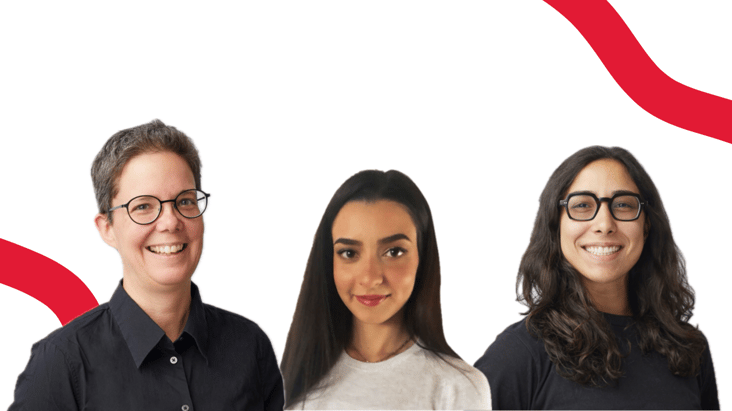
Three Italian-speaking women in STEM discuss working at FAIRTIQ and their experience with the Italian public transport industry
A couple weeks ago, we spoke to three Italian-speaking women at FAIRTIQ. Claudia, Loredana and Ilaria all share Italian as their mother tongue, and we were keen to have their perspective on working in the tech and public transport sector, in italiano. According to the European Institute for Gender Equality (EIGE), as of the beginning of this decade, transport is a prime example of a sector that still employs relatively few women in decision-making roles (only 22.2 % of the workforce).
Could you briefly introduce yourselves, including your flavour of “italianità”?
Claudia: I’m from Ticino, the Italian-speaking side of Switzerland. As one of the minority communities in Switzerland, Ticinesi are a bridge between Switzerland and Italy. Language and culture - for example, we learn Italian literature at school - set us close to Italy. On the other hand, Ticinesi shares the values and rules of Switzerland; we also learn French and German at school early on.
"Growing up between two cultures was, fortunately, a rather positive experience for me"
Loredana: I come from a Southern Italian family - my father’s side is from Napoli, where the culture is generally loud, open, colourful and passionate, and my mother’s side is from Apulia, which is often more relaxed, nature-bound and slow-paced. I grew up in Zurich’s Italian community, so I speak not just Italian but also Neapolitan and Apulian dialects. In addition, I learned all of the other Swiss languages at school. “Growing up between two cultures” was, fortunately, a rather positive experience for me.
Ilaria: I was born and raised in Reggio Calabria. Situated in the centre of the Mediterranean Sea, my region is fortunate to have a rich natural environment and a history that goes back thousands of years. I have always travelled as much as possible, first within the peninsula and then beyond, where I have visited and lived in many different countries.
As women working in the public transport industry, what is it like to work at a tech company like FAIRTIQ?
Loredana: Personally, I have found there has always been room and encouragement for me—and many other women at FAIRTIQ—to grow professionally within the company, assume responsibilities, and take on leadership roles. This is not a given, as the world of public transport can sometimes be perceived as a conservative and male-dominated industry.
"FAIRTIQ is a diverse company where equality is highly valued"
Ilaria: I agree, I feel like the prevailing culture at FAIRTIQ encourages us to go beyond preconceptions and believe that everyone can bring valuable contributions. We are a diverse company where equality is highly valued - at least half of my colleagues are females. However, when I participate in conferences or other working events, I often notice that women are in the minority. All organisations should challenge themselves to understand this is still happening, and what they can do about it. Those of us in STEM (science, technology, engineering and mathematics) careers can act as role models, showing young women that they can succeed in any field.

Ilaria attending and speaking at a conference in Bari, Italy
You recently worked on projects in Italy. What did you find surprising about the public transport sector in Italy?
Claudia: The governance of Italian public transport tends to be complicated and to make it difficult to provide a seamless and easy experience to customers. But I have found genuine interest in overcoming this fragmentation with innovative tools, and this explains the positive reception FAIRTIQ has enjoyed in Italy.
"Diving into Italian public transport on a professional level, what surprised me was the willingness to innovate"
Ilaria: I agree; as an Italian public transport user, I have experienced the challenges it can present. But diving into it on a professional level, what surprised me was the willingness to innovate, yet almost matched by an equal level of apprehension. There’s a great demand for solutions like FAIRTIQ which could simplify access to the service for many, but a doubt remains that the public is not ready to use innovative solutions.
Loredana: There’s a lot of interest in new technologies and a lot of fear of them. The fear tends to come from concern for the older generations—they’re traditionally used to buying their tickets at the tobacco shop rather than through a phone. But when I think of my older family members, I know they’re using some of the latest smartphones. My grandmother, who is almost 80, sends me GIFs, voice notes and emoji-adorned WhatsApp messages daily!
.jpeg?width=2560&height=1707&name=lore%20(1).jpeg)
Loredana and Ilaria at a conference in Bari, Italy
We thank Loredana, Claudia and Ilaria for their valuable insight
If you would like to learn more about implementing FAIRTIQ in your region, explore our solutions or contact FAIRTIQ’s Italian team. Did you know? In 2023, Switzerland was ranked 4th best country for women launching their careers in STEM. If you would like to launch your STEM career, why not explore our current job openings.


.png?width=732&name=image%20(2).png)




Share